Spiritual Kung Fu (1978)
Directed by: Lo Wei
Written by: Pan Lei
Starring: Jackie Chan, James Tien, Kao Kuang, Wu Wen-siu
AKA QUAN JING
HONG KONG
RUNNING TIME: 94 mins
REVIEWED BY: Dr Lenera
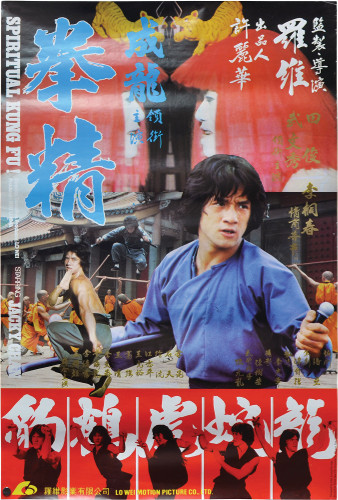
Yi-Lang is a smart-alec martial arts student at a Shaolin Temple. An anonymous thief steals a book from the library which teaches the Seven Deadly Fist style. Yi-Lang, along with a group of five other monks, is punished for not stopping the thief, but his bravery leads to him signing up to defend a supposedly haunted portion of the school. Discovering that the ghosts are masters of a supposedly lost style of fighting known as The Five Animal Fist Style, Yi-Lang offers himself as a student….
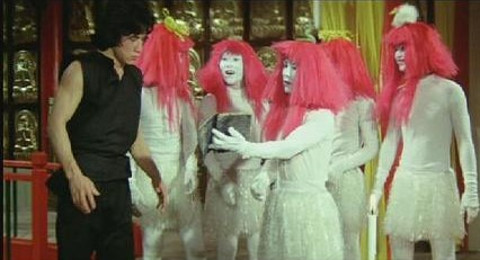
The third of these recent 88 Films Jackie Chan releases that I’ve reviewed was the only one I’d never seen. I’d heard it was awful, so was expecting something very poor indeed even though every single one of these early Lo Wei-produced-and-usually-directed efforts has been better than I remembered it. And indeed Spiritual Kung Fu didn’t turn out to be a bad watch at all, even if it may still belong in the lower echelon of Chan’s work in the ‘70s. Generally considered a stupid comedy, it is often comedic and often stupid in its first half, though of course that needn’t stop it from being funny. Put it this way, if you’re amused by the idea of Chan being beaten in a fight by a girl who tells him he looks like a teapot when he’s trying to do the crane style, then getting his own back and poking her in the head with his crane beak/fist goads, “A teapot? Is that right?”, than you’ll often chuckle. Wei does sometimes stoop to the very low while at the same time making you wonder if young children were the intended audience, though what’s really curious is that the humour is almost forgotten in the second half which is your typical traditional martial arts actioner with many of the usual beats, though the always good if not quite great fights are plentiful and the plotting is done with enough skill that one is rather surprised by a revelation near the end.
Chan felt restricted by Wei’s control, so Wei finally relented and let him make a film with no input from Wei whatsoever. The director was Chen Chi Hwa who had partly directed Shaolin Wooden Man and entirely directed Snake And Crane Arts Of Shaolin, and from whom Chan says he learnt the art of directing from watching him. However, the very comedic Half A Loaf Of Kung Fu was hated by Wei, who promptly shelved it, then decided to make his own comedy Chan picture. Just before commencing shooting on Spiritual Kung Fu, Wei came up with the bright idea of filming back to back with another Chan film, Dragon Lord. Chan hated having to perform some of his scenes against nothing because the ghosts would be superimposed later. Wei then shelved both films, partly due to his studio having ran out of money, and was more than happy to loan Chan out to Seasonal Films for a two-picture deal. When Snake in the Eagle’s Shadow and Drunken Master became huge hits and finally broke Chan, Wei gave belated releases to Spiritual Kung Fu and Dragon Fist, which both did fairly well. For some reason, some Chinese versions have Yi-Lang being knocked unconscious with an strike to the back of the neck, but others have him being knocked out with poison from a burning joss stick. The Korean version also omits the opening temple shots and removes some scenes while adding two others; Yi Lang rolling around with a girlfriend near the beginning [a scene which makes his reactions upon meeting Fong rather strange], and said girlfriend catching him with Fong after which the two ladies have a brief fight over the lucky Yi-Lang.
So we’re back in the Shaolin Temple, and nice images of the monks going about their business [sometimes when it’s raining, sometimes when it’s not] appear behind the titles with – I couldn’t believe it – a track from Miklos Rozsa’s terrific score to The Golden Voyage Of Sinbad. Of course I ought to be used to the pilfering from film scores in these films, and the track with its oriental note patterns goes with what we see on screen very well, but I was still surprised. Yi-Lang is first seen trying to walk while balancing one end of a training bench which carries three bowls of water upon his shoulders. Obviously a task he’s been ordered to carry out as part of his training, he attempts to cheat at it, but this is seen by the head Abbott who throws a cup at him, knocking the bench on to the floor, then makes him walk about with a beam strapped to the back of his neck which is a little easier. What’s interesting is that, even though this was made before the Seasonal duo, Chan’s character in those and indeed some of the films to follow is already almost fully formed here, the cheeky, lazy, disrespectful and impetuous youth. There’s soon some action as a masked person resembling a ninja breaks into the place, quickly bests the guards including Yi-Lang whom he simply knocks out from behind, and takes his manual. The Abbott decides to live in a cave under the temple for 100 days as penance while the guards get to spend three days in isolation, after which Yi-Lang kindly get the others food [see Chan breaking a chicken’s neck!] and is forced to do calligraphy with an enormous pen. It’s funnier than it sounds, though it’s evident already that the genre-mocking subversiveness and even sometime wit of Half A Loaf Of Kung Fu will not be a part of this film, Wei generally just going for silliness and crudity.
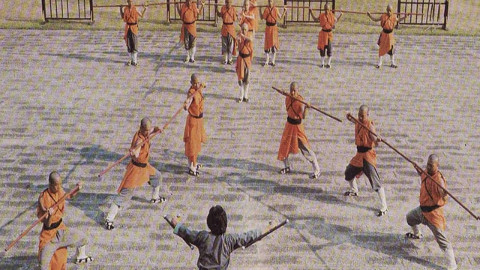
The lengthy sequence of Yi-Lang and the others first encountering the ghosts is a well sustained passage of lunacy. The ghosts, who by the way include an uncredited Yuen Biao though you can’t recognise him, wear long red wigs and white leotard bodysuits with tutus and white face paint, and are accompanied by almost proto-techno synth bass grooves. They can’t be seen at first unless somebody puts a parchment on their face, and the person doing that is likely to see his friends as skeletons, which are really unconvincing Halloween skeletons with skulls that look like those of apes, but does that really matter in this particular film? They move Yi-Lang’s bed and pillow while he’s sleeping, try to pull his clothes off, take his shoes so It looks like they’re walking by themselves and then when Yi-Lang stands on them the ghosts all roll down the stairs. And then Yi-Lang wees on them, which seems to release this formally hidden manual. Apart from the weeing it’s all so kiddie-ish – actually scratch that, this includes the weeing. And yet the sense that things will continue in this vein turns out to be wrong, because apart from the afore-mentioned encounters between Yi-Lang and this girl, Fong, that he likes who’s probably the first girl he’s ever seen [“are you a girl” he asks], the [intended] comedy disappears as things become a standard if reasonably well done ‘chop socky’ revenge saga. Luk Qing, who’s father was prevented from being the Abbott of the Shaolin Temple, is the one behind the taking of the manual [don’t worry we learn this very early on], and is now using what he’s learned from it to defeat [well, kill] other clan leaders. Meanwhile the leader of the Wu-Tang Clan [yay] arrives at the Shaolin Temple and it’s his daughter Fong whom Yi-Lung takes a shine too. But then he’s found murdered. Who could be the culprit? While looking back now there is a clue near the beginning, the red herring stuff and eventual surprise did fool me while watching.
Perennial genre villain James Tien quickly bests several opponents, and there seems to have been some awkward cutting down of one scene where he cartwheels over an opponent which seems to kill him. Chan doesn’t fight until battling Wu Wen-siu who plays Fong. It’s a nice contrast as she’s more dance-like while he sticks to the animal styles. Yi-Lung’s training is relatively simple and partly involves him perfecting stuff we’d seen Chan perfect previously, but of course the fact that it’s being carried out by ghosts adds a fun twist, and isn’t it funny that his character is undergoing said training mostly because he wants to give a beating to a girl who defeated him [how insulting!]? The highpoint is when Yi-Lung has to pass two tests before being allowed to leave the Shaolin Temple, the Wooden Men being presumably out of action. The first involves him having to engage in a staff duel, and Chan’s incredible skill with this weapon is totally in evidence as are his amazing acrobatics. The second has him fight off 38 monks with tongfas and, while still fairly traditional and conservative technically, it has much of the fluidity of the Chan glories to come. Chan would fight Tien again in Dragon Lord, but that fight was inferior to their two battles here, which seem to have had more effort put into them despite those ghosts interfearing in the second one which is really irritating since Yi-Lung is cheating in a way- though I guess they felt they had to bring back the ghosts who had disappeared. However, there’s so little time between the two fights one wonders why they bothered staging the first one. Still, Wen-siu gets a few more blows in, and of course there’s an extra surprise villain for our hero to fight too.
A sparkler on a string quite obviously represents a meteor in a bizarre little flashback and you can also see reflections that you shouldn’t during the main ghost sequence, though Wei’s direction is steadier than it sometimes is. He’s really a strange filmmaker. Sometimes he’ll experiment with stylisation which often fails to come off because he’s just not good enough, sometimes he seems disinterested, and sometimes he turns in a thoroughly professional job with genuinely good use of framing, the latter being very apparent when seeing his films in the right aspect ratio. Spiritual Kung Fu is mostly the latter, though the camera focus goes in a few places [this may be just as much the fault of cinematographer Chan Wing-Shu], and day and night seem to alternate throughout. Frankie Chan is credited with the music and as usual he just found stuff and put it in. The Sinbad score is used throughout and that grand Rozsa sound does almost add some grandeur to the proceedings, though there’s a lot of other very dramatic music cues employed too. Spiritual Kung Fu probably ought to be crap. Its second half is so different in tone from the first that it seems like a different movie, the ghosts seem shoehorned in, the laughs are as cheap as they come, yet I get the feeling that Wei wasn’t particularly interested in the comedy and just put it in because he had an inkling that’s what audiences wanted from Chan. Quite often scenes don’t even seem to flow into each other properly, even though Wei would have had time to sort this out. But – what the hell – I had quite a good time with it, though I wouldn’t recommend it at all for a relative newcomer to Chan.
Rating: 











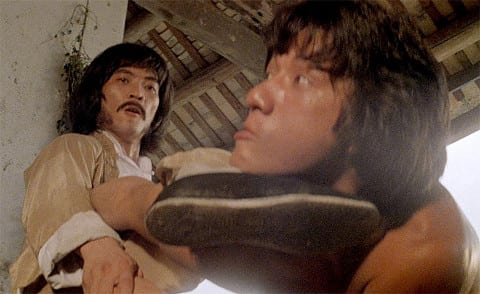
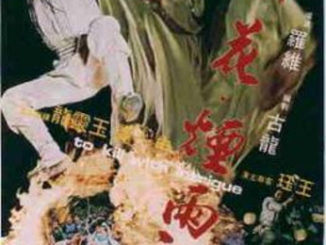
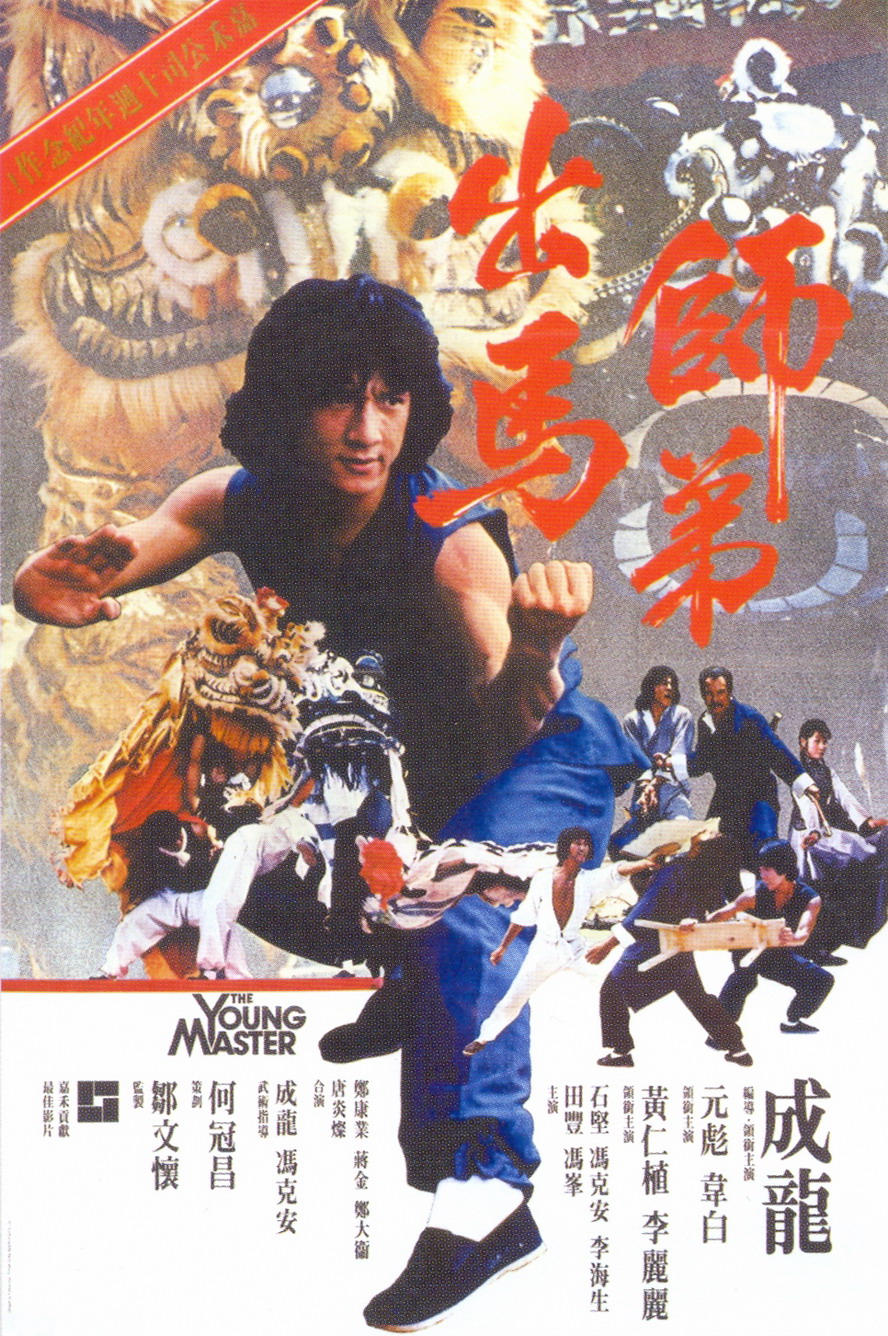
Be the first to comment